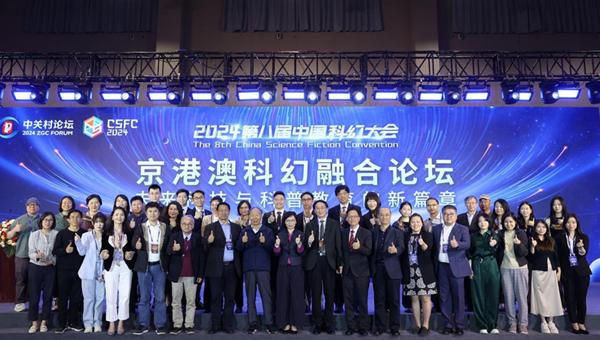
 0 Comment(s)
0 Comment(s) Print
Print E-mail China.org.cn, May 6, 2024
E-mail China.org.cn, May 6, 2024
An important forum aimed at promoting communication and cooperation between Beijing, Hong Kong and Macao in technology innovation and popular science education was held during the China Science Fiction Convention 2024 in Beijing.

Participating guests and speakers pose for a group photo at the end of the Beijing-Hong Kong-Macao Science Fiction Integration Forum held during the China Science Fiction Convention 2024 in Beijing, April 28, 2024. [Photo courtesy of Hong Kong Science Popularization and Science Fiction Academy]
The Beijing-Hong Kong-Macao Science Fiction Integration Forum, themed "A New Chapter of Future Technology and Popular Science Education," attracted more than 200 participants, including experts, teachers, students, sci-tech workers, sci-fi writers, and government representatives.
The forum was organized by the Beijing Yuanyu Science Fiction and Future Technology Research Institute, the Hong Kong Science Popularization and Science Fiction Academy, and Shijingshan district's Future Science Fiction Industry Development Center. It aimed to encourage sci-tech cultural exchange and cooperation across the three regions while promoting future advancement in technology and science education.
Qian Hang, a standing member of the Communist Party of China Shijingshan District Committee in Beijing and head of the district's United Front Work Department, revealed that the sci-fi industry in Shijingshan is beginning to take shape.
"A sci-fi region in west Beijing is rapidly emerging, and there is close exchange and cooperation between Beijing, Hong Kong and Macao," Qian said. "This not only actively contributes to the integrated economic development of the region but will also inject new vitality into the prosperity of the sci-fi industry."
Shang Hailong, a member of the Legislative Council of the Hong Kong Special Administrative Region and a consultant for SenseTime, delivered a keynote speech titled "Connecting Two Major Centers, Aggregating Talent Effects, and Promoting the Rapid Development of Artificial Intelligence (AI)." He explored the concept of "science fiction becoming reality" and how it has driven multiple waves of human productivity revolutions. He stressed the importance of developing new quality productive forces represented by artificial intelligence. Additionally, Shang stated that the "one country, two systems" policy allows for the appreciation of diverse thinking arising from different advantageous systems.
In discussions later on, renowned sci-fi writer Wang Jinkang stated that humanity will inevitably face a steep transition in its long, linear development and should adapt to the disruptions brought about by AI by aligning with reality and objective principles. His peer, Liu Cixin, cautioned that the advent of true AI capable of fulfilling all our needs is not necessarily a positive development. Liu emphasized that humans must maintain a spirit of constant pioneering and exploration of new frontiers and the unknown for long-term survival.
Experts, sci-tech museum managers, and school headteachers from Beijing, Hong Kong, and Macao also explored strategies to inspire interest in science and technology innovations and promote science education among students in schools across the three regions.
Yuen Yuet Po, curator of the Hong Kong Science Museum, pointed out that sci-fi and science mutually promote each other: "Science fiction presents imaginative visions of the future, and inspired by these visions, scientists continuously explore new technological fields, driving the progress and development of technology."
Bai Gengsheng, vice chairman of the China Writers Association, echoed the same sentiment in his speech. "Without imagination, the advancement of science and technology would be very slow; without science fiction, our imaginations would forever remain mere daydreams," Bai said. "The combination of science, technology, and literature represents a powerful alliance and is a vanguard in China's efforts to build strength in culture."
Meng Fanxing, vice chairman of the Beijing Association for Science and Technology, added that technological innovations, popular science, and sci-fi education propel social progress and human civilization. "In this era of increasingly advanced information dissemination, technological innovations are emerging continuously. Popular science education keeps pace with the times, while sci-fi education is an important channel to stimulate the curiosity and imagination of young people and a vital means to cultivate their scientific literacy," Meng concluded.
Go to Forum >>0 Comment(s)